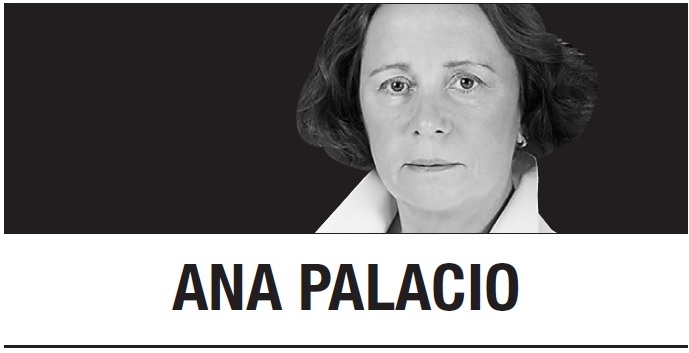The gruesome scenes left behind after Russia’s withdrawal from Bucha, where Ukraine accuses Russian troops of torturing and slaughtering civilians, have intensified pressure on the West to provide more offensive weapons to Ukraine and for Europe to ban Russian energy imports. But beyond the legitimate question of Europe’s willingness to pay such a high price on Ukraine’s behalf lies the stark reality that sanctions are hardly a silver bullet.
Calls for sanctions began well before the invasion. When Russia was massing troops near Ukraine’s border, the Ukrainian government -- and some American lawmakers -- urged the United States and Europe to impose preemptive sanctions and offer Ukraine stronger security guarantees. But Western leaders demurred, arguing that sanctions would impede their ability to reach a diplomatic solution.
Of course, in geopolitics, as in life, hindsight is 20/20: We now know that those diplomatic efforts were in vain. What we do not know is whether preemptive sanctions would have motivated Russian President Vladimir Putin to rethink his plans, especially given that preemptive sanctions most likely would not have been as severe as the package of measures imposed after the Kremlin launched the invasion.
That package, after all, is the most comprehensive and coordinated punitive action taken against a major power since World War II. Overcoming initial reservations, the European Union joined the US in cutting off Russian banks from the arteries of global finance in a matter of days. The West also froze much of the Russian central bank’s foreign-exchange reserves.
At first, the sanctions seemed to be having the intended effect. Within a week, the ruble had fallen by a third against the US dollar. Tumbling share prices forced the authorities to suspend trading on the Moscow stock exchange for nearly a month. Russia’s gross domestic product is expected to contract by 10-15 percent this year.
But, even as the sanctions vise continues to tighten, Russian markets appear to be stabilizing. Thanks to robust intervention by the authorities, the ruble is now trading close to its prewar levels, and the stock market has recovered some losses. With the violence showing no sign of abating, Western governments must be clear about what sanctions can and cannot achieve -- and how much sacrifice is acceptable.
The most comprehensive analysis of sanctions use, conducted by researchers at Drexel University, found that the goals of sanctions were completely met in only 35 percent of cases. Where sanctions have had an impact they have been combined with other measures to advance a specific foreign-policy objective.
Moreover, even well-targeted sanctions and asset freezes have limited efficacy against autocracies. From North Korea to Iran, dictatorial regimes shield themselves and their cronies from economic pain through convoluted schemes to evade sanctions. Putin’s regime -- including his cronies -- has proved adept at ensuring that sanctions do not affect them.
Instead, it is ordinary Russians who will pay the price for today’s sanctions. And, contrary to the hopes of some in the West, this is unlikely to lead to Putin’s fall from power. Dictators are not particularly vulnerable to shifts in public opinion. And a revolution does not seem forthcoming, not least because of the work of the Kremlin’s increasing repression and powerful propaganda machine.
While Putin’s regime insulated itself from the pain of sanctions, Europe is facing high costs of its own. Though Western economies are not particularly dependent on Russia overall, Europe relies on it for a large share of its energy. So, while the US Congress votes to ban all Russian energy imports, EU leaders have targeted only Russian coal, not oil or gas.
A comprehensive ban on Russian energy imports to Europe would undoubtedly increase the pressure on the Kremlin. But such a decision must be approached with care. As German Chancellor Olaf Scholz recently warned, the economic and social costs of a sudden embargo would be massive. It will take time to wean Europe off Russian natural gas.
Equally important, sanctions are an integral part of a broader negotiating strategy. Once the West has launched all its biggest economic weapons, it will have no remaining leverage. There must be room to escalate in response to Putin’s actions, particularly the deployment of chemical or tactical nuclear weapons.
The West’s arsenal in Ukraine is clearly limited. Sanctions are an important and powerful weapon, and they are putting some pressure on the Kremlin. But given their limitations -- and the costs that must be borne by both the West and ordinary Russians -- they must be used judiciously. Otherwise, Putin, who appears to believe his paranoid propaganda and oversees the world’s largest nuclear arsenal, may conclude that he has nothing to lose.
Ana PalacioAna Palacio, a former foreign minister of Spain and former senior vice president and general counsel of the World Bank Group, is a visiting lecturer at Georgetown University. -- Ed.
(Project Syndicate)By Korea Herald (
khnews@heraldcorp.com)





![[Herald Interview] 'Trump will use tariffs as first line of defense for American manufacturing'](http://res.heraldm.com/phpwas/restmb_idxmake.php?idx=644&simg=/content/image/2024/11/26/20241126050017_0.jpg)

![[Herald Review] 'Gangnam B-Side' combines social realism with masterful suspense, performance](http://res.heraldm.com/phpwas/restmb_idxmake.php?idx=644&simg=/content/image/2024/11/25/20241125050072_0.jpg)
![[Health and care] Getting cancer young: Why cancer isn’t just an older person’s battle](http://res.heraldm.com/phpwas/restmb_idxmake.php?idx=644&simg=/content/image/2024/11/26/20241126050043_0.jpg)